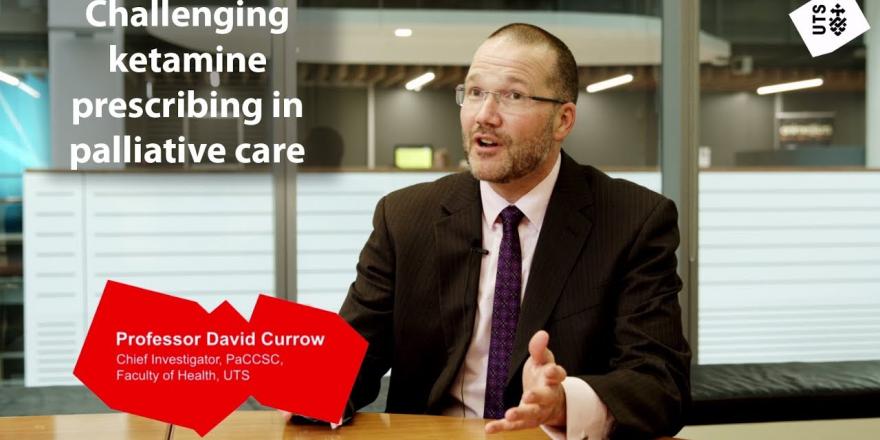Cancer clinical trials are important for the significant number of Australians who are diagnosed with cancer every year. Through our clinical trials, we research options for improved management of symptoms that can occur due to a cancer diagnosis and related treatments.

Open clinical trials
Please go to the IMPACCT Trials Coordination Centre (ITCC) Clinical trials page to read frequently asked questions about clinical trials. Consumer, health professional and researcher queries may be directed to itcc@uts.edu.au.
DEPART Pain
Investigators

Dr Jessica Lee is the lead investigator for this study in Australia. The Co-lead study investigator in Japan is Dr Hiromichi Matsuoka.
The Australian investigation team includes Professor David Currow, Emerita Professor Jane Phillips, Professor Meera Agar, Professor Melanie Lovell, Dr Slavica Kochovska, Professor Brian Le, Beverley Noble, Linda Brown, and Belinda Fazekas.
Health condition/type of cancer
Neuropathic cancer pain
Full study title
A phase III, international, multi-centre, double-blind, dose increment, parallel-arm, randomised controlled trial of duloxetine versus pregabalin over 14 days for opioid unresponsive cancer-related neuropathic pain.
ANZCTR trial ID
Aim
To enhance the evidence base for the pharmacological treatment of opioid refractory cancer-related neuropathic pain by testing the effectiveness of duloxetine compared to pregabalin.
Summary
Management of neuropathic pain that is relatively unresponsive to opioids remains an important challenge for people with cancer.
Gabapentinoids like pregabalin and serotonin noradrenalin reuptake inhibitors (SNRIs) like duloxetine have the potential to reduce neuropathic cancer pain, but to date there has been no head-to-head comparison for the net effect of these medications.
This clinical trial will compare the effects of duloxetine with pregabalin for the management of opioid unresponsive neuropathic cancer pain.
You may be eligible to enrol in this trial if you are aged 18 years or older and have been diagnosed with cancer and neuropathic cancer pain.
Participating sites
- Calvary Health Care Kogarah (New South Wales)
- Liverpool Hospital (New South Wales)
- Mater Hospital Brisbane (Queensland)
- St Vincent's Hospital Melbourne (Victoria)
- St Vincent's Hospital Sydney (New South Wales)
- The Royal Melbourne Hospital (Victoria)
Funding
This clinical trial has received a National Health and Medical Research Council (NHMRC) Clinical Trials and Cohort Studies Grant.
Tetrahydrocannabinol (THC) for cancer-related anorexia
Investigators

The Principal Investigator for this study is Professor Meera Agar.
The investigation team includes Professor Jennifer Martin, Professor David Currow, Professor Nicholas Lintzeris, Professor Nadia Solowij, Emerita Professor Jane Phillips, Professor Melanie Lovell, Bev Noble, Professor Richard Chye, Dr Jessica Lee, Dr Rajesh Aggarwal, Professor Katherine Clark, Linda Brown, Dr Valentina Naumovski, Dr Phillip McCloud, Belinda Fazekas, Dr Seong Leang Cheah and Dr Nikki McCaffrey.
Health condition
Cancer-related anorexia
Full study title
Phase IIb double-blind, placebo-controlled study of oral delta-9-tetrahydrocannabinol (Namisol®) for anorexia in people with advanced cancer
ANZCTR trial ID
ACTRN12619000491167 [opens external site]
Aim
The principal aim of this combined phase IIb study is to determine the efficacy of oral Tetrahydrocannabinol (THC) on anorexia-cachexia related symptoms in people with advanced cancer
Summary
Anorexia is the second most common condition in advanced cancer, affecting up to 90% of sufferers. Current pharmacological therapies for anorexia include progestins and corticosteroids, which provide limited and short-term improvements in appetite, weight or food enjoyment; and use is often limited by side effects.
This study will determine if oral THC can improve anorexia-related symptoms and concerns for people with advanced cancer.
The trial will recruit participants 18 years or over who have advanced cancer and have anorexia for at least two weeks that is unresponsive to other treatments.
Participating sites
tbc
Funding
New South Wales Ministry of Health
PRESERVE Aotearoa New Zealand
Investigators

The principal investigator in New Zealand for this study is Dr Aileen Collier. Co-principal investigators for the Australian study are Associate Professor Annmarie Hosie and Professor Meera Agar.
The investigation team includes Emerita Professor Jane Phillips, Professor Lawrence Lam, Dr Slavica Kochovska, Meg Brassil, Beverly Noble, Professor Susan Kurrle, Anne Cumming, Associate Professor Gideon Caplan, Professor Richard Chye, Dr Brian Le, Professor E Wesley Ely, Associate Professor Peter Lawlor, Dr Shirley Bush, Dr Jan Maree Davis, Professor Melanie Lovell, Dr Seong Leang Cheah, Dr Kaye Basire and Dr Vicki Jones.
Health condition/type of cancer
Delirium, advanced cancer
Full study title
The PRESERVE Aotearoa pilot study (Prevent delirium through Eating and drinking, Sleep, Exercise, Reorientation, Vision and hearing, and Enabling family)
ANZCTR trial ID
tbc
Aim
To determine if a tailored multi-component non-pharmacological delirium prevention intervention is feasible and acceptable for people with advanced cancer in hospital.
Summary
Delirium is an acute neurocognitive disorder, medical emergency and has serious healthcare complications. According to the Australian Commission on Safety and Quality in Health Care, an episode in hospital causes patients and family members great distress and increases the risk of falls, physical and mental decline, longer hospital stay and death.
This study will involve interviews with patients, family caregivers, staff and volunteers. It will obtain their perspectives about the feasibility and acceptability of study processes and measures. treatments.
You may be eligible to participate in this trial if you are aged 18 years or older and have been diagnosed with advanced cancer.
Participating sites
- Te Omanga Hospice, Lower Hutt
- Waipuna Hospice, Bay of Plenty
Funding
This study is funded by a Cancer Research Trust NZ grant 2019.
Closed clinical trials
We welcome your interest and enquiries about past trials' outcomes. If you would like to find out more about these trials, please email itcc@uts.edu.au
Anamorelin for anorexia - LUANA trial
Investigators
The Coordinating Principal Invetigator for this study is Professor David Currow. The investigation team includes Professor Peter Martin, Professor Miriam Johnson, Dr Victoria Bray, Dr Matthew Maddocks, Alex Bullock, Dr Mariana Sousa, Dr Slavica Kochovska, Dr Sungwon Change, Dr Deidre Morgan, Professor Meera Agar, Profeessor Michael Linda and Dr Irina Kinchin. Consumer representatives include John Stubbs and Dr Phillip Lee. Associate investigators include Belinda Fazekas, Linda Brown and Dr Valentina Naumovski.
Health condition/type of cancer
Anorexia in people with small cell lung cancer
Full study title
Phase II, double-blind, placebo-controlled, parallel-arm, fixed-dose, multi-site study to evaluate the safety, feasibility and desirability of conducting a fully powered phase III study of anamorelin for anorexia in people with small cell lung cancer.
Aim
To demonstrate safety, desirability (sufficient signal in the efficacy evaluation) , and feasibility of conducting a fully powered phase III study of anamorelin HCl (100mg) for the treatment of anorexia in people with small cell lung cancer.
ANZCTR trial ID
Summary
Loss of appetite (anorexia) is experienced by most people with lung cancer during the course of their disease and treatment. It is a major contributor to weight loss and can lead to impaired physical capacity and reduced ability of people to cope with and complete their cancer treatment. Despite this, effective and long-term treatments of cancer-associated anorexia are lacking and it remains an area of ongoing clinical need.
The investigators proposed to test anamorelin HCI administered daily for 12 weeks in people with anorexia and lung cancer in this phase II, double-blind, placebo-controlled, parallel-arm, fixed-dose, multi-site study. The establishment of feasibility, desirability and the qualitative data from this study will inform the conduct of a subsequent robust effectiveness phase III trial.
Publications
Sousa MS, Martin P, Johnson MJ, Lind M, Maddocks M, et al. (2023) Phase II, double blind, placebo controlled, multi-site study to evaluate the safety, feasibility and desirability of conducting a phase III study of anamorelin for anorexia in people with small cell lung cancer: A study protocol (LUANA trial). PLOS ONE 18(5): e0285850. https://doi.org/10.1371/journal.pone.0285850
Cancer Dexamethasone Trial (CADET)
Investigators
The co-principal investigators for this study were Dr Peter Eastman and Associate Professor Brian Le.
The study team included Professor David Currow, Belinda Fazekas and Linda Brown.
Health condition
Cancer pain, palliative care
Full study title
Cancer Dexamethasone Trial (CADET) Part 1: A multi-centre, single-arm, feasibility study of oral dexamethasone in the management of cancer-related pain.
ANZCTR trial ID
Aim
To determine the feasibility of conducting a study or oral dexamethasone in the management of uncontrolled pain related to cancer or its treatment.
Summary
Pain is a common and distressing symptom for many people with cancer. Up to 30% of patients continue to experience pain despite currently available therapies including opioids. This study was devised as a multi-centre single-arm pilot study aimed at assessing the feasibility of undertaking a larger, more sophisticated trial investigating the use of a medicine called dexamethasone for people with unstable cancer-related pain. Unfortunately, despite alternations to the study protocol and experience clinical trial site feasibility was not able to be demonstrated.
Participating sites
- Barwon Health
- The Royal Melbourne Hospital
- St Vincent's Hospital Melbourne
- South Adelaide Palliative Services
Funding
This study was undertaken under the auspices of the Palliative Care Clinical Studies Collaborative (PaCCSC), which was funded by the Australian Commonwealth Department of Health.
Outcomes
This study occurred in two stages as the initial eligibility criteria were broadened in light of real-time monitoring of screening log data and poor recruitment. One hundred and seventy-two people were screen across the two study iterations with only nine people ultimately found to be eligible for enrolment. This meant that the primary feasibility outcomes were not able to be met. The commonest reason for people to be ineligible for study participation was that they were already prescribed corticosteroids or NSAIDS. While the overall outcome was disappointing, it did reinforce the benefits of undertaking feasibility studies prior to launching into larger, more sophisticated, and expensive research endeavours. Ongoing research into the use of corticosteroids in unstable cancer pain is clearly required, however how this might be best achieved is unclear.
Publications
Eastman, P., Currow, D.C., Fazekas, B., Brown, L., & Le, B. (2019). Oral dexamethasone in the management of cancer-related pain: A feasibility study. Palliative Medicine. DOI: https://doi.org/10.1177/0269216319827802 .
Cancer pain assessment study
Investigators

Emerita Professor Jane Phillips was the lead investigator for this study.
The investigation team included Professor Tim Shaw, Professor Melanie Lovell, Professor Patricia Davidson, Professor Frances Boyle, Professor Lawrence Lam, Dr Nikki McCaffrey, Professor Paul Harnett, Ms Nicole Heneka and Mr John Stubbs.
Study communiques
Health condition
Cancer pain
Study title
Improving patient-reported pain outcomes through mHealth practitioner training: A phase III wait-listed randomised control trial
ANZCTR Trial ID
ACTRN12618001103257 (opens external site)
Aim
This project addressed a priority identified at the Australian National Pain Summit in March 2010 to reduce unrelieved cancer pain by improving cancer and palliative clinicians' pain assessment capabilities.
Summary
This study was an mHealth inter-professional training and support intervention. mHealth refers to medical or public health practice supported by mobile devices (i.e. phones, patient monitoring devices, personal digital assistants, and other wireless devices). Our mHealth intervention combined:
- an online spaced learning module that delivered authentic case-based cancer pain assessment scenarios directly to a clinician's mobile device
- real-time site-specific pain assessment audit and feedback, providing de-identified peer to peer comparisons, and
- online links to evidence-based pain assessment decision supports. The intervention was delivered via the online QStream platform directly to clinicians' e-mails and will be accessible from their mobile devices.
Participating sites
The wait-listed randomised controlled trial (RCT) was coordinated by Improving Palliative, Aged and Chronic Care through Research and Translation (IMPACCT). The RCT was conducted at six sites across New South Wales, Australia:
- Concord Repatriation Hospital
- Calvary Mater Newcastle
- Prince of Wales Hospital
- Braeside Hospital
- Greenwich Hospital
- Neringah Hospital
Funding
Cancer Australia - Priority-driven Collaborative Cancer Research Scheme (PdCCRS 1127011)
Publications
Phillips, J.L., Heneka, N., Lovell, M., Lam, L., Davidson, P., Boyle, F., . . . Shaw, T. (2019). A phase III wait-listed randomised controlled trial of novel targeted inter-professional clinical education intervention to improve cancer patients' outcomes (The Cancer Pain Assessment (CPAS) Trial): study protocol. Trials, 20(1), 62. doi: 10.1186/s13063-018-3152-z
Inoperable malignant bowel obstructions (IMBO)
Investigators
The principal investigators for this study are Professor David Currow and Professor Meera Agar.
The investigation team includes Professor Katherine Clark, Dr Caitlin Sheehan, Dr Alison Davis, Professor Alexander Engel, Professor Selvan Pather, Associate Professor Lisa Pont, Dr Irina Kinchin, Dr Sungwon Chang, Linda Brown, and Meg Brassil.
Health condition
Inoperable malignant bowel obstruction (IMBO)
Full study title
Improving the management of Inoperable Malignant Bowel Obstruction. A phase II, multi-site, double-blind, randomised placebo-controlled feasibility trial of crushed oral famotidine.
ANZCTR trial ID
pending
Aim
The purpose of this phase II study is to determine whether it is feasible to conduct a study of crushed oral dexamethasone, either with or without daily crushed oral famotidine in the management of inoperable malignant bowel obstructions (IMBO). The results will determine whether it is feasible to proceed to a phase III study.
Summary
Bowel obstruction is prevalent in people with advanced cancer and there is no currently registered pharmacological therapy for the medical management in people too frail for surgery or where surgery would not be appropriate. This study will evaluate a promising therapy that may reduce the symptoms of inoperable malignant bowel obstruction.
The trial will recruit participants 18 years or over who have advanced, terminal malignancy with a clinically confirmed malignant bowel obstruction causing vomiting that is deemed not suitable for surgery.
Participating sites
pending
Funding
pending
Ketamine for complex cancer pain

Challenging ketamine prescribing in palliative care – IMPACCT, Faculty of Health, UTS
Professor David Currow, Chief Investigator, PaCCSC - Ketamine is widely used around the world and there's great evidence that it helps in post-operative pain relief. But when used for palliative care at low doses, unfortunately it showed no benefit over placebo and had lots more toxicity. We want to minimise toxicity in an already frail population and maximise benefits. We've seen a change in practice that we've measured across Australasia. Most people are using much less of it, some people are not using it at all, as a result of this particular study.
©2017 University of Technology Sydney
Investigators
The lead investigator for this study was Professor David Currow.
The investigation team included Professor Meera Agar, Dr Christine Sanderson (NHMRC gran recipient) and Belinda Fazekas.
Health condition
Pain from cancer or cancer treatment
Full study title
A randomised, double-blind placebo-controlled study of subcutaneous ketamine in the management of cancer pain.
ANZCTR trial ID
Aim
This study investigated the effectiveness of the pain-killing drug, ketamine, in people with widespread cancer who were receiving palliative care and had difficult cancer pain that did not respond well to opioid drugs.
Summary
Severe pain related to cancer is usually treated with strong pain medications such as opioids, like morphine. Increasing doses of opioids do not always provide the pain relief needed without causing unpleasant side effects. Ketamine is a medication used in anaesthesia that has also been used to supplement the effects of opioids. The full effects (good and bad) of ketamine when used to control strong pain were not clear. Ketamine was identified by the initial scoping study as a medicine commonly used in the palliative care setting without appropriate evidence. More research was needed to support its continued use for the relief of pain caused by cancer.
Participating sites
11 sites from New South Wales, Victoria, Queensland, South Australia and Western Australia
Funding
Commonwealth Department of Health
NHMRC Palliative Care New Investigators Grant
Outcomes
The study demonstrated that there was no difference in pain levels between those patients who were allocated to placebo, and those who were allocated to ketamine. Some individuals reported an improvement in their own pain without the knowledge of which intervention they were receiving.
In addition, patients who received ketamine did report a much higher level of side effects. Overall, one person in six receiving ketamine experienced these unpleasant side effects. Ketamine has limited use for pain relief and can cause unpleasant side effects for many.
The study was conducted between March 2008 and February 2011 and recruited 185 participants across 11 sites.
Publications
Hardy, J., Quinn, S., Fazekas, B., Plummer, J., Eckermann, S., Agar, M., Spruyt, O., Rowett, D., Currow, D.C. (2012). Randomized, Double-Blind, Placebo-Controlled Study to Assess the Efficacy and Toxicity of Subcutaneous Ketamine in the Management of Cancer Pain. Journal of Clinical Oncology, 30(29), 3611-3617. doi: 10.1200/JCO.2012.42.1081
Hardy, J.R., Spruyt, O., Quinn, S.J., Devilee, L.R., Currow, D.C. (2014). Implementing practice change in chronic cancer pain management: clinical response to a phase III study of ketamine. Internal Medicine Journal, 44(6), 586-591. doi: 10.1111/imj.12442
Hardy, J., Quinn, S., Fazekas, B., Agar, M., Currow, D. (2013). Can the LANSS scale be used to classify pain in chronic cancer pain trials? Supportive Care in Cancer, 21(12), 3387-3391. doi: 10.1007/s00520-013-1921-5
McCaffrey, N., Flint, T., Kaambwa, B., Fazekas, B., Rowett, D., Currow, D.C., Hardy, J., Agar, M., Quinn, S., Eckermann, S. (2019). Economic evaluation of the randomised, double-blind, placebo-controlled study of subcutaneous ketamine in the management of chronic cancer pain. Palliative Medicine, 33(1), 74-81. doi: 10.1177/0269216318801754
Lidocaine for neuropathic cancer pain
Investigators

The principal investigator for this study is Dr Jessica Lee.
The chief investigation team includes Professor Meera Agar, Professor David Currow, Professor Melanie Lovell, Emerita Professor Jane Phillips, Professor Andrew McLachlan, Beverly Noble, Linda Brown, Dr Nikki McCaffrey, Belinda Fazekas.
The associate investigation team includes Associate Professor Richard Chye, Dr Rajesh Aggarwal, Dr Davinia Seah, Associate Professor Christine Sanderson, Dr Caitlin Sheehan, Associate Professor Ghauri Aggarwal, Dr Kat Urban, Dr Dipti Mittal, Priyanka Bhattarai, Dr Anthony Linton.
Health condition
Neuropathic cancer pain (nerve pain due to cancer)
Full study title
A multi-centre double-blind randomised controlled trial of subcutaneous lidocaine (lignocaine) for the management of neuropathic cancer pain - a feasibility study.
ANZCTR trial ID
ACTRN12617000747325 (opens external site)
Aim
The primary purpose of this trial is to evaluate the feasibility, efficacy and toxicity of continuous lidocaine (lignocaine) for the treatment of neuropathic pain in people with cancer.
Summary
At least two-thirds of people with advanced cancer experience pain. Despite a growing body of research, there remains a proportion of pain that is poorly controlled with existing management strategies. In the European Pain in Cancer Survey, 58% of those receiving prescription medication for pain reported inadequate pain relief at least several times a week.
You may be eligible to participate in this trial if you are aged 18 years or over, have been diagnosed with cancer (solid tumour or haematological), and have neuropathic pain related to the cancer or its treatment.
Participating sites
- Concord Centre for Palliative Care (Concord Repatriation General Hospital)
- Liverpool Hospital
- St Vincent's Hospital
Funding
This study is being supported by PaCCSC, IMPACCT and a NSW Health PhD scholarship.
Publications
Lee, J.T., Sanderson, C.R., Xuan, W., Agar, M. (2019). Lidocaine for Cancer Pain in Adults: A Systematic Review and Meta-Analysis. Journal of Palliative Medicine. Mar 2019. ahead of print. doi: 10.1089/jpm.2018.0257
Management of nausea in cancer patients - study 1
Investigators

The Lead Investigator for this study was Professor Patsy Yates.
The investigation team included Professor Janet Hardy, Professor David Currow, Associate Professor Peter Martin, Professor Jennifer Philip, Associate Professor Geoff Mitchell, Associate Professor Peter Hudson, Associate Professor Alexandra Clavarino, Associate Professor Paul Glare, Dr Helen Skerman and Associate Professor Simon Eckermann.
Collaboration
This study was conducted in collaboration with Queensland University of Technology (QUT).
Health condition
Nausea in advanced cancer not related to anti-cancer therapy
Full study title
The effectiveness of guideline-driven antiemetic therapy versus single-agent therapy in patients with cancer and nausea not related to cancer therapy.
ANZCTR trial ID
Aim
The primary aim of this study is to undertake a controlled trial to evaluate the efficacy of aetiology-based antiemetic guidelines in improving the management of nausea, by comparing outcomes with patients who are managed using single-agent therapy (haloperidol) alone.
Background
Nausea in advanced cancer is a multifaceted problem. Recent systematic reviews had concluded that aetiology-based guidelines may be effective in reducing nausea, but no rigorously controlled studies had been undertaken to trail this approach. Evidence to support the implementation of guidelines in practice was limited and contradictory, and a number of barriers to the implementation of the guidelines had been identified.
Participating sites
- Barwon Health
- Braeside Hospital
- Calvary Health Care
- Hunter New England Area Health Service
- Mater Hospital Brisbane
- Peter MacCallum Cancer Centre
- Sacred Heart Hospice, Darlinghurst
- Southern Adelaide Palliative Care Services
- St Vincent's Hospital Brisbane
- St Vincent's Hospital Melbourne
- St Vincent's Hospital Sydney
- The Alfred
- The Royal Melbourne Hospital
Funding
National Health and Medical Research Council (NHMRC)
Outcomes
Nausea scores and distress from nausea improved over time in the majority of the 185 study participants. A greater response rate was seen in the guideline arm than the single-agent arm at 24 hours but not at 48 or 72 hours where no significant difference was seen. Over 80% of participants reported an improved change. There were few adverse events worse than baseline in both the guideline and the single agent's arms.
It was concluded that an aetiology-based, guideline-directed approach to antiemetic therapy may offer more rapid benefit, but it is no better than single-agent treatment with haloperidol at 72 hours.
Publications
Hardy, J., Skerman, H., Glare, P., Philip, J., Hudson, P., Mitchell, G., Martin, P., Spruyt, P., Currow, D., Yates, P., (2018). A randomized open-label study of guideline-driven antiemetic therapy versus single-agent antiemetic therapy in patients with advanced cancer and nausea not related to anticancer treatment. BMC Cancer 18(1) 510 doi 10.1186/s12885-018-4404-8
Management of nausea in cancer patients - study 3
Investigators
The lead investigator for this study was Professor Janet Hardy.
The investigation team included Professor Patsy Yates, Professor David Currow, Associate Professor Peter Martin, Professor Jennifer Philip, Associate Professor Geoff Mitchell, Associate Professor Peter Hudson, Dr Helen Skeman and Dr Phillip Good.
Health condition
Nausea in cancer not related to anticancer treatment
Full study title
A study for participants with cancer who experience ongoing nausea not related to their treatment despite taking standard and usual medications, that studies the effectiveness of oral methotrimeprazine versus oral haloperidol.
ANTCTR trial ID
Aim
The aim of this study was to assess the efficacy of oral methotrimeprazine versus oral haloperidol in people with cancer and nausea not related to anticancer treatment.
Summary
Many people with cancer experience chronic nausea that has a significant impact on their quality of life. Nausea (and vomiting) unrelated to anticancer treatment remains an important and under-researched health problem.
Results of the Management of nausea in cancer patients - study 1 suggest that the two approaches in that study were both effective in reducing nausea. In study 1, haloperidol was identified as effective for people with cancer-related nausea. In this study, the efficacy of oral methotrimeprazine, which is currently not licensed for this scenario, was assessed against haloperidol.
Participating sites
- Barwon Health
- Camden Hospital
- Greenwich Hospital
- Mater Health Services
- Sacred Heart Hospice, St Vincent's Hospital Sydney
- St Vincent's Hospital Brisbane
- St Vincent's Hospital Melbourne
Funding
- National Health and Medical Research Council (NHMRC) research grant
- Palliative Care Clinical Studies Collaborative (PaCCSC)
- The Queensland University of Technology
Management of nausea in cancer patients
Investigators

The Coordinating Principal Investigator for this study is Associate Professor Phillip Good.
The investigation team includes Professor Janet Hardy, Professor Jennifer Philip, Dr Jennifer Weil, Professor Greg Crawford, Dr Richard Neil and Professor Patsy Yates.
Health condition
Nausea in cancer
Full study title
A randomised controlled study of oral ondansetron versus olanzapine versus haloperidol in patients with cancer and nausea not related to anticancer therapy (nausea 4 pilot study)
Aim
The aim of this study is to compare the effect of three anti-nausea medications on the management of nausea in people with cancer.
Summary
Many people with cancer experience chronic nausea that has a significant impact on their quality of life. Nausea (and vomiting) unrelated to anti-cancer treatment remains an important and under-researched health problem.
You may be eligible to join this study if you are aged 18 years or older, have been diagnosed with cancer and experiencing nausea.
Participating sites
Mater Hospital
Funding
Medicinal cannabis for anorexia in advanced cancer
Investigators

Professor Meera Agar was the lead investigator for this study.
The investigation team included the Program Coordinator, Dr Valentina Naumovski, and the Cannabinoids for Cancer Symptoms Research Grop (CCSRG)
Health condition
Cancer, anorexia
Full study title
Phase I/II dose-ranging study of the pharmacokinetics dose-response parameters, and feasibility of vaporised botanical cannabis flower bud in advanced cancer.
ANZCTR trial ID
Aim
The aim of this trial was to assess whether vaporised medicinal cannabis is safe, feasible and effective in increasing appetite in cancer patients with anorexia.
Summary
Anorexia affects up to 90% of people with advanced cancer. Current pharmacological therapies for anorexia provide short-term improvements in appetite, weight or or food enjoyment but use is often limited by side effects.
This study investigated whether vaporised botanical flower bud was more rapidly absorbed compared to previous oral cannabinoid studies, and whether this might improve appetite and hunger while improving taste and enjoyment of food.
Participants in this trial were aged 18 years or over, had advanced cancer and had been suffering from anorexia for at least two weeks.
Participating sites
Sacred Heart Hospice, St Vincent's Hospital, Darlinghurst, New South Wales
Funding
New South Wales Government Ministry of Health
Megestrol dexamethasone and placebo for anorexia
Investigators
The lead investigator for this study was Professor Paul Glare.
The study investigation team included Professor Peter Martin, Dr Roger Hunt, Associate Professor Judy Bauer, Dr Judi Greaves, Professor Martin Tattersall, Dr Susan D Whicker, Professor Felix Bochner, Professor Aminah Jatoi, Professor Simon Eckermann and Professor David Currow (corresponding investigator).
Health condition
Anorexia in people with cancer
Full study title
Randomised, double-blind control trial of megestrol acetate, dexamethasone and placebo in the management of anorexia in people with cancer.
ANZCTR Trial ID
Aim
Primary objectives
The study compared megestrol versus placebo and dexamethasone versus placebo for their ability to stimulate appetite.
Secondary objectives
The study also compared relative consequences of therapy (efficacy, adverse events, quality of life and distress in participant and families, resources use and cost) and hence net clinical benefit and net benefit.
Summary
Anorexia is a common and distressing problem in people with advanced cancer and other life-limiting illnesses.
Despite encouraging results from a US study, megestrol is not currently prescribed extensively as an appetite stimulant to Australians with advanced cancer, primarily due to its cost. The results from that study, or others, do not provide sufficient evidence of the net clinical benefit, relative efficacy, toxicity, or cost benefit of these two agents in people with advanced cancer receiving palliative care. This study population is likely to be sicker and have a shorter survival than those in the previous studies, and the principal aims of therapy (appetite stimulation and quality of life) differ from the other study populations where weight gain and improved function were the principal aims. This study proposed to further investigate whether megestrol would stimulate appetite in people with anorexia as a result of cancer or its treatments.
Participating sites
- Flinders Medical Centre (South Australia)
- The Alfred (Victoria)
- Ballarat Health Service (Victoria)
- St John of God Health Care (Victoria)
- Barwon Health (Victoria)
- Hollywood Private Hospital (Western Australia)
- Peter MacCallum Cancer Centre (Victoria)
- Sydney South West Area Health Service (New South Wales)
- Royal Prince Alfred Hospital (New South Wales)
- St Vincent's Hospital, Melbourne (Victoria)
- Mater Health Services (Queensland)
Funding
Commonwealth Department of Health and Ageing
Melatonin for prevention of delirium
Investigators

Professor Meera Agar was the lead investigator for this study.
The investigation team included Professor David Currow, Emerita Professor Jane Phillips, Dr Annmarie Hosie and Dr Tim Luckett.
Health condition
Delirium, advanced cancer
Full study title
Randomised, double-blind, placebo-controlled phase III trial of oral melatonin for the prevention of delirium in hospital in people with advanced cancer.
ANZCTR trial ID
Aim
The primary purpose of this trial was to evaluate the effectiveness of melatonin in preventing delirium in hospital inpatients with advanced cancer.
Summary
Despite being preventable in many cases, two thirds of people with advanced cancer will have a delirium episode at some point while in hospital. Delirium causes additional medical complications, excess mortality, high levels of patient and caregiver distress, and significant increases in health care costs. Delirium adversely affects cognition, awareness and communication ability at a critical time when being mentally aware and interacting with loved ones is crucial for quality of life.
Among preventative strategies for delirium, most evidence is available for interventions that include exercise and cognitive components too demanding for hospitalised people with advanced cancer. Recently, melatonin has been highlighted as a potential pharmacological alternative that has few side-effects and good potential for cost-effectiveness.
This study was for patients aged 18 years or older who had been diagnosed with advanced cancer for which the intention of treatment was not to cure, and who had been admitted to an acute or sub-acute inpatient hospital facility within the previous 48 hours.
Participating sites
- Barwon Health - McKellar Centre campus (Victoria)
- Braeside Hospital (New South Wales)
- The Canberra Hospital (Australian Capital Territory)
- Concord Repatriation Hospital, Concord (New South Wales)
- Flinders Medical Centre, Bedford Park (South Australia)
- Liverpool Hospital (New South Wales)
- Repatriation Hospital, Daw Park (South Australia)
- Royal Melbourne Hospital - city campus, Parkville (Victoria)
- Sacred Heart Hospice, Darlinghurst (New South Wales)
- St Vincent's Hospital (Melbourne) Ltd, Fitzroy (Victoria)
- St Vincent's Private Hospital, Kew (Victoria)
Funding
Cancer Australia
Octreotide for bowel obstruction
Investigators

The lead investigator for this study was Professor David Currow.
The study investigation team included Professor Meera Agar and Belinda Fazekas.
Health condition
Bowel obstruction in advanced cancer
Full study title
A randomised double-blind placebo-controlled trial of infusional subcutaneous octreotide in the management of malignant bowel obstruction in people with advanced cancer.
ANZCTR trial ID
ACTRN12608000211369
Aim
This study looked at the effectiveness of the drug, octreotide, in palliative care management of bowel obstruction caused by cancer in people with advanced cancer.
Summary
Bowel obstruction in the setting of advanced cancer is frequently encountered in palliative patients. Current management options included: surgery where reasonable; nil by mouth; nasogastric decompression or continuous suction; medications for pain relief; medications to reduce secretions.
None of these interventions had been the subject of an adequately powered study to determine the net clinical benefit, and more aggressive interventions such as surgery may not have been appropriate for someone close to the end of life.
Octreotide is a medication that has specific effects including the potential to inhibit the release of hormones controlling secretions in the gut. Other studies of octreotide for malignant bowel obstruction suggested a benefit favouring the use of octreotide. A randomised controlled trial to examine the additional effect of octreotide over standard care was required.
Participating sites
This study was conducted as a collaborative trial of PaCCSC. Participating sites included:
- Mater Health Services, South Brisbane, Queensland (Prof. Janet R Hardy)
- Braeside Hospital (Hope Healthcare), Liverpool Hospital, Camden Hospital and Canterbury Hospital, New South Wales (Prof. Meera Agar)
- Calvary Mater Newcastle, Warabrook, New South Wales (Prof. K Clark)
- Sacred Heart Hospice, Darlinghurst, New South Wales (Prof. Richard Chye and Prof. Jane Phillips)
- Calvary Health Care, Kogarah, New South Wales (Dr Christine Sanderson)
- Peter MacCallum Cancer Centre, East Melbourne, Victoria (Dr Odette Spruyt)
- St Vincent's Hospital (Melbourne), Fitzroy, Victoria (Dr Jennifer Phillips)
- Southern Adelaide Palliative Services, Repatriation General Hospital, Daw Park, Flinders Medical Centre, Bedford Park, South Australia (Dr Peter Allcroft)
- Curtin University, Bentley and Hollywood Private Hospital, Western Australia (Dr Derek Eng)
- The Alfred, Prahan, Victoria (Dr Michelle Gold)
- Royal Prince Alfred, Camperdown, New South Wales (Prof. Paul Glare)
Funding
Commonwealth Department of Health
Outcomes
This study does not support the routine use of octreotide in addition to ranitidine and dexamethasone for the symptomatic treatment of inoperable malignant bowel obstruction. There may be benefit in sub-population, but their characteristics were not evident from attempts to identify such populations across the patients recruited in this study. Octreotide was well tolerated, but the higher likelihood of hyoscine butylbromide administration for colicky pain suggests that there may be symptomatic burden from octreotide in some patients.
The study was conducted between August 2008 and May 2012 and recruited 106 participants across 12 sites.
Publications
Currow, D., Quinn, S., Agar, M., Fazekas, B., Hardy, J., McCaffrey, N., Eckermann, S., Abernathy, A.P., Clark, K. (2015). Double-Blind, Placebo-Controlled, Randomized Trial of Octreotide in Malignant Bowel Obstruction. Journal of Pain and Symptom Management, 49(5), 814-821. doi: 10.1016/j.painsymman.2014.09.013
Mercadante, S. (2015). Octreotide for Malignant Bowel Obstruction: Commentary on Currow et al. Journal of Pain and Symptom Management, 49(5), 813. doi: 10.1016/j.painsymman.2016.04.001
Campbell, R., McCaffrey, N., Brown, L., Agar, M., Clark, K., Currow, DC (2018). Clinician-reported changes in octreotide prescribing for malignant bowel obstruction as a result of an adequately powered phase III study: A transnational, online survey. Palliative Medicine, 32(8), 1363-1368. doi: 10.1177/0269216318778460
The PRESERVE pilot study
Investigators

The lead investigator for this study was Professor Meera Agar.
The study team included Associate Professor Annmarie Hosie and Emerita Professor Jane Phillips.
Health condition
Delirium, advanced cancer
Full study title
Phase 2 (pilot) cluster randomised controlled trial of a multi-component non-pharmacological intervention to prevent delirium for hospitalised people with advanced cancer.
ANZCTR Trial ID
ACTRN12617001070325
Aim
This study aimed to determine if a tailored multi-component non-pharmacological delirium prevention intervention was feasible and acceptable for people with advanced cancer.
Summary
Delirium is a significant medical complication for hospitalised patients. Up to one-third of delirium episodes are preventable in older inpatients through non-pharmacological strategies that support essential human needs, such as physical and cognitive activity, sleep, hydration, vision and hearing. We hypothesised that a multi-component intervention similarly may decrease delirium incidence, and/or its duration and severity in inpatients with advanced cancer. Prior to a phase 3 trial, we aimed to determine if a multi-component non-pharmacological delirium prevention intervention is feasible and acceptable for this specific patient group.
Participating sites
- Calvary Health Care Kogarah (New South Wales)
- Camden Hospital (New South Wales)
- Greenwich Hospital (New South Wales)
- The Queen Elizabeth Hospital (South Australia)
Funding
National Breast Cancer Foundation
Publications
Hosie, A., Phillips, J., Lam, L., Kochovska, S., Noble, B., Brassil, M., Kurrle, S.E., Cumming, A., Caplan, G.A., Chye, R., Le, B., Ely, E.W., Lawlor, P.G., Bush, S.H., Davis, J.M., Lovell, M., Brown, L., Fazekas, B., Cheah, S.L., Edwards, L., Agar, M. (2018). Multicomponent non-pharmacological intervention to prevent delirium for hospitalised people with advanced cancer: study protocol for a phase II cluster randomised controlled trial. BMT Open 28:9(1) DOI: 10.1136/bmjopen-2018-026177

